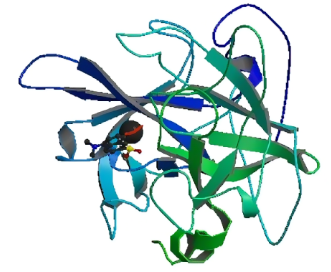Tenecteplase is a bioengineered alteplase variant that can be manufactured using recombinant DNA technology. It binds to fibrin and activates fibrin-bound plasminogen to transform into plasminase. Tenecteplase exhibits much higher fibrin specificity, increased resistance to inactivation by endogenous inhibitor plasminogen activator inhibitor (PAI-1), and a longer half-life compared to native tPA. It can be used to treat acute myocardial infarction and pulmonary embolism clinically, as well as acute ischemic stroke, deep vein thrombosis and other vascular diseases. Studies have shown Tenecteplase, at 0.5 mg/kg, has regulatory approval to treat ST-segment-elevation myocardial infarction, for which it has equivalent 30-day mortality and fewer systemic hemorrhages. And Tenecteplase superiority in recanalization of large vessel occlusions and non-inferiority in disability-free 3-month outcome, without increases in symptomatic intracranial hemorrhage or mortality.

